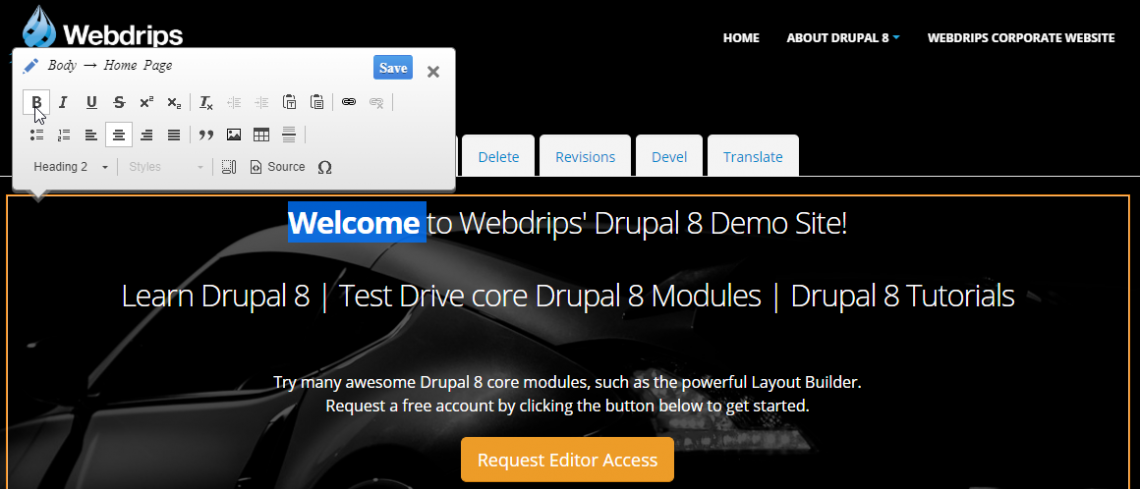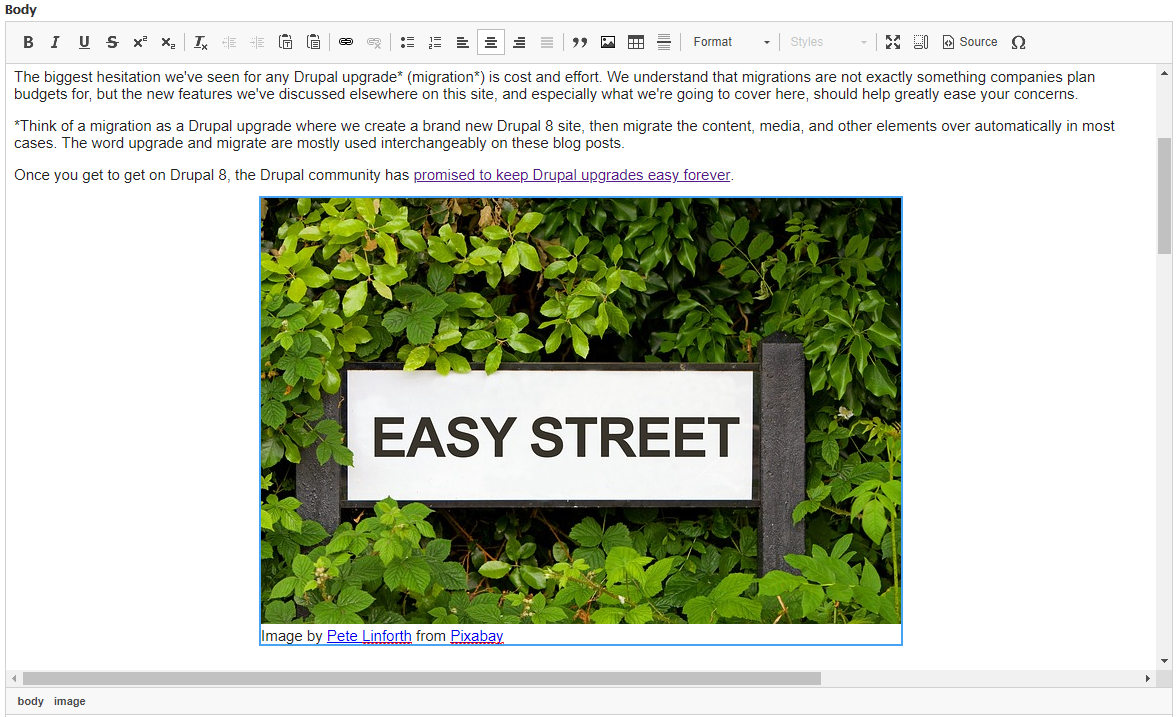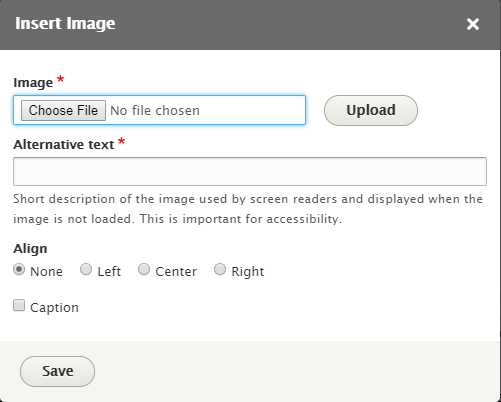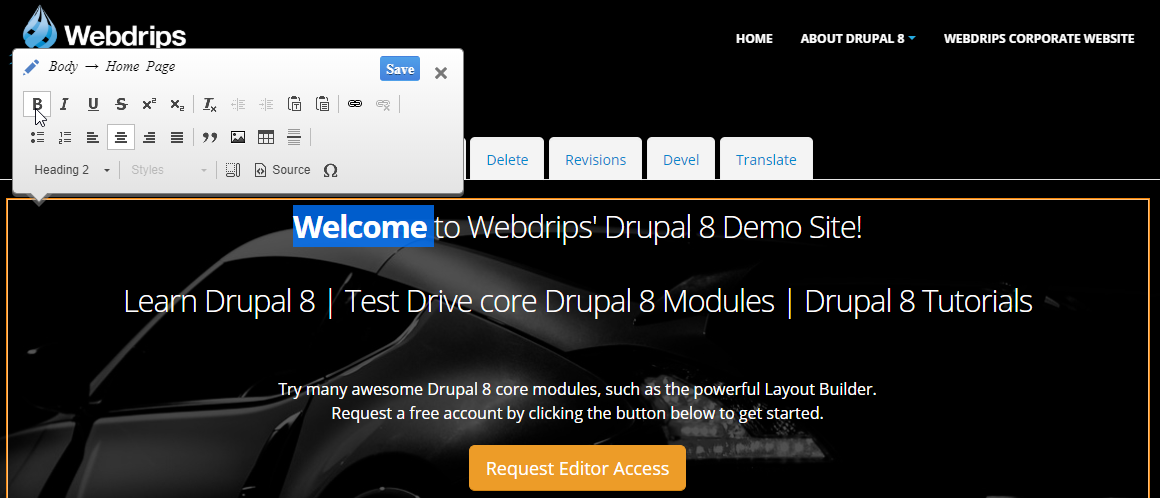
Introducing the Vastly Improved Drupal 8 Content Editor Authoring Experience
For years, one of the biggest gripes about Drupal was the authoring experience was severely lacking, clumsy, and often time consuming. This issue could be exacerbated further if the site suffered from poor architecture decisions.
Drupal 7 was a reasonable step forward over prior versions after installing several Drupal contributed modules, but a developer was really needed to tie everything together.
What's a Module? Drupal Modules provide plug-and-play features and functionality. Typically you can enable and configure them to make their feature and/or function available. Drupal has core modules that "ship" with Drupal, and nearly 7,000 contributed modules available for Drupal 8. Contributed modules are modules added and maintained by the Drupal community.
As of Drupal 8.6, the following Drupal core modules are available to vastly improve the authoring experience:
- Quick Edit module (shown in the hero image above) allows you to hover over editable content, edit it, and save it on-the-fly.
- CKEditor module provides a powerful WYSIWYG editor (discussed below).
- Layout Builder module allows you to change your page layout without hiring a Drupal developer or Drupal agency.
- Media and Media Library modules provides a nice User Interface (UI) for adding and managing media assets (images, files, audio, and video).
- Workspaces module provides an Agile-like workflow for your content creation process that allows site editors to prepare and preview a complete set of related content on the live server before making it available to the public.
- Workflows module provides a simple UI for creating basic to complex content moderation and governance workflows.
- Multilingual modules add the ability to translate content and the authoring environment into other languages easily.
That's seven new modules (so far) built into Drupal core to improve the content editing experience and the authoring environment.
The Built-in CKEditor module provides a Nice WYSIWYG Experience
The built in CKEditor module provides a WYSIWYG (What You See Is What You Get) tool that gives the feeling of creating a page kind of like Google Docs or Microsoft Word.

The CKEditor module is very useful for creating uniform consistent-looking content across pages, blocks, and other Drupal entities. With a little configuration help, the ensure your site will look more cohesive across content areas by configuring available fonts and other style elements.
Place Images, Resize Images Using Drag, and add Alt text and a Caption All with Ease
With prior versions of Drupal, resizing images was done by setting the size manually, then checking the results, and repeating until satisfied. That's not exactly a friendly user experience.

Inserting an image, setting the alignment, and adding alt text and a caption are now all super easy with the Image Widget (shown above). Drupal is very smart in how it handles your added images and caption. For starters, left or right alignment will automatically wrap the text around the image. Centered images like the one above have no wrapping. It all just makes sense!
Why is the Drupal 8 Content Editor Experience so Much Better?
While deciding on what new features should be part of Drupal 8 core, the community got together and came up with "core initiatives" (now called strategic initiatives).
The user experience for Drupal 8 was not only made a core initiative, Acquia and the Drupal community came up with a persona for both content creators and site builders. That commitment to improving the ease of use paid off big time with all the improvements listed in the Introduction above. Typically, content editors shouldn’t need to understand HTML in order to add or edit the majority of a site’s content, and that has now been made possible with Drupal 8 out of box with the release of Drupal 8.0.0.
After the basic improvements were in place, the community started delivering other core modules like the incredible Layout Builder module. These types of modules drastically reduce the cost of ownership for Drupal websites by placing more and more power in the hands of editors without having to get a developer or Agency involved.
Conclusion
As of Drupal 8.6, there are a whopping seven new built-in modules that make up what is now a vastly improved content editor authoring experience. Also the administration UI has been streamlined and given a nice facelift. For content editors and site builders, Drupal 8 delivers the experience they’ve been waiting for.
The great news is, you can request free access to this Drupal 8 demo site using the button below, and test drive these features yourself with walkthrough tutorials (if desired), and without having to install or configure anything yourself.
